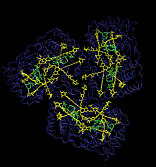Research Topics - Bioenergetics
Photosynthetic complexes provide fascinating challenges to biophysicists. With the availability of recent atomic structures for protein-pigment complexes such as photosystem I in cyanobacteria and plants, it is possible to form a comprehensive picture of the light absorption and excitation migration processes based on an atomic level quantum mechanical description. This kind of structural analysis not only provides a rigorous test for our understanding of the physics of these mechanisms through a comparison to spectroscopy and kinetics experiments, but it also forms a framework within which the organizational principles for multi-component pigment-protein assemblies can be investigated.
In light-harvesting complexes, carotenoids act as light-absorbers in the blue-green region of the spectrum. Absorption of a photon is followed by rapid singlet excitation energy transfer to bacteriochlorophyll (BChl). In addition to their light-harvesting role, carotenoids photoprotect antenna complexes, i.e., they prevent the formation of photo-oxidizing singlet oxygen by quenching BChl triplet states through triplet excitation transfer. Light-harvesting and photoprotection by carotenoids is studied in Theoretical Biophysics Group in two proteins, the Light-Harvesting Complex II of Purple Bacteria, and the Peridinin-Chlorophyll-Protein of Dinoflagellates.
Papers
Zooming in on ATP hydrolysis in F1. Markus Dittrich and Klaus Schulten. Journal of Bioenergetics and Biomembranes, 37:441-444, 2005.
Comparison of the light harvesting networks of plant and cyanobacterial photosystem I. Melih K. Sener, Craig Jolley, Adam Ben-Shem, Petra Fromme, Nathan Nelson, Roberta Croce, and Klaus Schulten. Biophysical Journal, 89:1630-1642, 2005.
When light falls in LOV: A quantum mechanical/molecular mechanical study of photoexcitation in Phot-LOV1 of Chlamydomonas reinhardtii. Markus Dittrich, Peter L. Freddolino, and Klaus Schulten. Journal of Physical Chemistry B, 109:13006-13013, 2005.
Physical principles of efficient excitation transfer in light harvesting. Melih Sener and Klaus Schulten. In David L. Andrews, editor, Energy Harvesting Materials, pp. 1-26. World Scientific, Singapore, 2005.
Role of water in transient cytochrome c2 docking. Felix Autenrieth, Emad Tajkhorshid, Klaus Schulten, and Zaida Luthey-Schulten. Journal of Physical Chemistry B, 108:20376-20387, 2004.
ATP hydrolysis in the βTP and βDP catalytic sites of F1-ATPase. Markus Dittrich, Shigehiko Hayashi, and Klaus Schulten. Biophysical Journal, 87:2954-2967, 2004.
Role of hydrogen-bond network in energy storage of bacteriorhodopsin's light-driven proton pump revealed by ab initio normal mode analysis. Shigehiko Hayashi, Emad Tajkhorshid, Hideki Kandori, and Klaus Schulten. Journal of the American Chemical Society, 126:10516-10517, 2004.
Excitation migration in trimeric cyanobacterial photosystem I. Melih K. Sener, Sanghyun Park, Deyu Lu, Ana Damjanović, Thorsten Ritz, Petra Fromme, and Klaus Schulten. Journal of Chemical Physics, 120:11183-11195, 2004.
Molecular dynamics simulation of bacteriorhodopsin's photoisomerization using ab initio forces for the excited chromophore. Shigehiko Hayashi, Emad Tajkhorshid, and Klaus Schulten. Biophysical Journal, 85:1440-1449, 2003.
Molecular dynamics investigation of primary photoinduced events in the activation of rhodopsin. Jan Saam, Emad Tajkhorshid, Shigehiko Hayashi, and Klaus Schulten. Biophysical Journal, 83:3097-3112, 2002.




